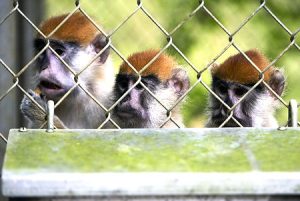Nechelmarie Fernandez Guzman
ENGL 3231
Prof. Ellen Pratt
November 5, 2009
Monkeys for Parenting Training
In recent discussions of responsible parenthood a controversial issue has been whether or not is implemented the practice of raising a monkey before having a baby to prove that the parents are prepared[1]. On one hand, some argue that this practice violates the monkey’s rights by the limit of captivity. On the other hand, some argue that it could be helpful in both ways: to help the future parents with a great experience and also to decrease the harm caused by these monkeys to the crops. My own view is that this practice should be implemented because it could assure the increase of better parenthood values and it could help others to decide if they really want a child.
As Christa Jones notes in her book Is my baby a monkey?, the importance of a preparation before the conception of a baby is critical for the parents to raise that baby in the better way. She offers her own experience in this book as she declares that having a baby without parent training was the most difficult experience of her life: “I was just 22 and my husband was 24 but we had no idea that having Eleonor will change our lives forever. I passed through hard things as depression and frustration, as I though how different this moment could be if I were better prepared” (14). Like Jones, are thousands and even millions of parents that have passed through this difficult moments. All this could be solved by the implementation of the practice stated above. Even when Jones affirm that she read a lot of parenting books, she admits that it wasn’t enough what these books said, experience is extremely different (25).
It is clear that the plague of monkeys in Puerto Rico is a serious issue that affects specially the agriculture. Miguel Ithier gave us in his article, “Monos en el oeste, la nueva plaga” the statistics about the population of monkeys and the harms made to the crops. The results of his investigation point that between 2006 and 2009 the “patas monkeys” population increased a 45% (17), these results are a cause of worry for the agricultural business and even for health because, as Ithier demonstrates, they are carriers of a diversity of diseases that can be transmitted to humans (18). If it’s created an organization that put these monkeys in captivity they could be medically checked and put to reproduction. Those baby monkeys that are born could be given to future parents to raise them and we could kill two birds with one shot: as we work with the monkey plague problem we help for the preparation of many couples with the experience of raising and loving this new life.

Fig. 1: Linslay, Patas Monkeys captured in Lajas PR, images.google.com.
Also, after having the experience and having a real baby, these monkeys could be excellent pets for these growing families after they are mature. And maybe there could be some of this couples that after having the experience could decide not having a real baby and stay with the monkey, which is fine because with this economic crisis an unnecessary increment in demography isn’t what we need.

Unknown, A baby Patas Monkey, images.google.com
In response to the claims made by the animal rights defendants, the fact that this is cruel for the monkeys because they are “taken from their natural life” (12) as Jenna Hopkins affirm in his essay “Patas Monkeys, the real story”, has no real value because these monkeys will have, by regulation, all the good care that they need and more. The objective here is that both, the monkey and the family are beneficiaries of this project. The monkeys will get a comfortable life, good food, health, and love; future parents will get the incredible experience and benefits that could result from this innovative practice.
Works Cited
A baby patas monkey. Google images. (2008).
Grant, Hugh. “Monkeys for prenatal training.” Parenting innovation 13.8 (2009): 10-15.
Hopkins, Jenna. “Patas monkeys: the real story.” Animal Rights 10.2 (2009): 11-14.
Ithier, Miguel. “Monos en el oeste, la nueva plaga.” Ecosistema 12 July 2009: 17-19.
Jones, Christa. Is my baby a monkey?. Boston: Casablanca, 2006.
Linslay. Monkeys captured in Lajas PR. Google Images. (2008).
[1] See Hugh Grant, “Monkeys for prenatal training,” Parenting Innovation 10 (2009).